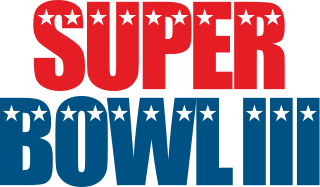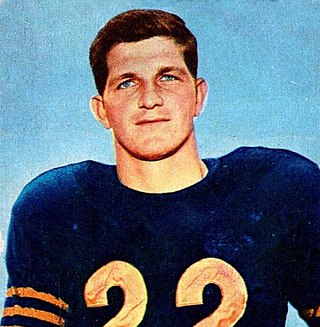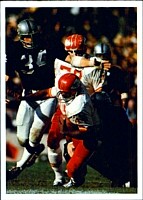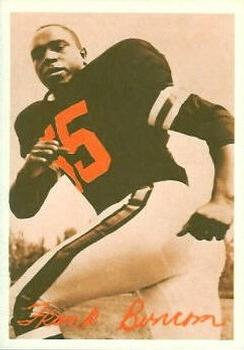Related Research Articles

Super Bowl III was an American football game played on January 12, 1969, at the Orange Bowl in Miami, Florida. It was the third AFL–NFL Championship Game in professional American football, and the first to officially bear the trademark name "Super Bowl". Super Bowl III is regarded as one of the greatest upsets in both American football history and in the history of professional sports. The 19 1⁄2- points underdog American Football League (AFL) champion New York Jets defeated the National Football League (NFL) champion Baltimore Colts by a score of 16–7.
The second AFL–NFL World Championship Game was an American football game played on January 14, 1968, at the Orange Bowl in Miami, Florida. The National Football League (NFL)'s defending champion Green Bay Packers defeated American Football League (AFL) champion Oakland Raiders by the score of 33–14. This game and the following year's are the only two Super Bowls played in the same stadium in consecutive seasons.

George Frederick Blanda was an American professional football quarterback and placekicker who played in the American Football League (AFL) and National Football League (NFL). Blanda played 26 seasons of professional football, the most in the sport's history, and had scored more points than anyone in history at the time of his retirement.
For its first nine seasons, 1960 through 1968, the American Football League determined its champion via a single playoff game between the winners of its two divisions.

The National Football League playoffs for the 1970 season began on December 26, 1970. The postseason tournament concluded with the Baltimore Colts defeating the Dallas Cowboys in Super Bowl V, 16–13, on January 17, 1971, at the Orange Bowl in Miami, Florida.
The National Football League playoffs for the 1974 season began on December 21, 1974. The postseason tournament concluded with the Pittsburgh Steelers defeating the Minnesota Vikings in Super Bowl IX, 16–6, on January 12, 1975, at Tulane Stadium in New Orleans, Louisiana.

The 1969 Kansas City Chiefs season was the team's tenth, their seventh in Kansas City, and the final season of the American Football League (AFL). It resulted in an 11–3 regular season record and three postseason road victories, including a 23–7 victory in Super Bowl IV over the NFL's heavily favored Minnesota Vikings.
The 1967 Oakland Raiders season was the team's eighth in Oakland. Under the command of second-year head coach John Rauch, the Raiders went 13–1 (.929), an American Football League (AFL) record, and captured their first Western Division title, four games ahead of runner-up Kansas City, the defending league champion.
The 1969 AFL playoffs was the postseason of the American Football League for its tenth and final season in 1969. For the first time, the ten-team league scheduled a four-team postseason, consisting of the top two teams from the two divisions. The division champions hosted the second place teams from the other division; both Western division teams won and advanced to the league championship game, with the winner advancing to play the NFL champion in Super Bowl IV in New Orleans on January 18, 1970.
The 1967 AFL Championship Game was the eighth American Football League championship game, played on December 31 at Oakland-Alameda County Coliseum in Oakland, California.

The 1966 Season was the 7th season for the San Diego Chargers as a professional American Football League (AFL) franchise; the team failed to improve on their 9–2–3 record from 1965. In the team's final season at Balboa Stadium, the Chargers went 7–6–1 and finished in third place in the AFL West Division. They would move to San Diego Stadium for the following season. It was the first season to feature an AFL-NFL World Championship Game, now known as the Super Bowl. San Diego began the season among the favorites to represent the AFL in the historic game, but faded after a 4–0 start, winning only three more times in the remaining ten games.

The 1965 San Diego Chargers season was their sixth as a professional AFL franchise; the team improved on their 8–5–1 record in 1964. Head Coach Sid Gillman led the Chargers to their fifth AFL West title with a 9–2–3 record, before losing the AFL Championship Game to the Buffalo Bills for the second consecutive season. It would prove to be the Chargers' last post-season appearance until 1979.

The 1964 San Diego Chargers season was their fifth as a professional AFL franchise; the team failed to repeat as AFL champions after winning the championship in 1963 with a record of 11–3, and finished at 8–5–1. San Diego struggled at the start and finish of the season, but a six-game winning streak in the middle proved to be enough to win the AFL West, in a league where the two strongest teams were in the Eastern division.
The 1970 Oakland Raiders season was the team's 11th season in Oakland. It was also their first season as members of the NFL. The Raiders would ultimately win their fourth consecutive division title. They advanced to the AFC Championship Game, where they lost to the Baltimore Colts.
The 1972 Houston Oilers season was their 13th season overall and third with the league. The team failed to improve on their previous season's output of 4–9–1, winning only one game. They missed the playoffs for the third consecutive season.
The 1969 Houston Oilers season was the tenth and final season for the Houston Oilers as a professional AFL franchise before moving to the National Football League when the two merged. The team equaled their 1968 record of 7–7 (.500), finishing 6–6–2. They qualified for the playoffs but lost in the divisional round to the Oakland Raiders.

The Heidi Game or Heidi Bowl was a 1968 American Football League (AFL) game between the Oakland Raiders and the visiting New York Jets. The contest, held on November 17, 1968, was notable for its exciting finish, in which Oakland scored two touchdowns in the final minute to win the game 43–32. However, NBC, the game's television broadcaster, decided to break away from its coverage on the East Coast to broadcast the television film Heidi, which caused many viewers to miss the Raiders' comeback.
The 1968 AFL Championship Game was the ninth annual title game of the American Football League, played on December 29 at Shea Stadium in Queens, New York City, New York. In a rematch of the notorious Heidi Game played earlier in the season, the New York Jets (11–3) of the Eastern Division hosted the defending champion Oakland Raiders (12–2) of the Western Division. Although the Raiders had the better record, the Jets were slight favorites. The Raiders had hosted a tiebreaker playoff game the week before against the Kansas City Chiefs (12–2) to determine the Western Division champion, while the Eastern champion Jets won their division outright and thus were idle.

The 1969 AFL Championship Game was the tenth and final championship game of the American Football League, and the league's final game prior to its merger with the National Football League on February 1, 1970.
The 1970 AFC Championship Game was the inaugural title game of the American Football Conference (AFC). Played on January 3, 1971, the game was hosted by the AFC East champion Baltimore Colts who played the AFC West champion Oakland Raiders at Memorial Stadium in Baltimore, Maryland. Along with the 1970 NFC Championship Game played on the same day, this game constituted the penultimate round of the 1970–71 NFL playoffs which had followed the 1970 regular season of the National Football League.
References
- 1 2 "Raiders use passing game to crush Kansas City 41-6". Lewiston Morning Tribune. (Idaho). Associated Press. December 23, 1968. p. 14.
- 1 2 "Raiders 'perfect' in playoff victory". Pittsburgh Press. UPI. December 23, 1968. p. 18.
- ↑ "Baltimore, Kansas City are favored in pro football divisional playoffs". Lewiston Morning Tribune. (Idaho). Associated Press. December 22, 1968. p. 18.
- ↑ "Raiders set for Chiefs in playoff". Reading Eagle. (Pennsylvania). Associated Press. December 22, 1968. p. 63.
- ↑ "Chiefs grind out 24-10 win". Milwaukee Sentinel. UPI. October 21, 1968. p. 1, part 2.
- ↑ "Lamonica keys Raiders past KC, 38-21". Milwaukee Sentinel. UPI. November 4, 1968. p. 1, part 2.
- ↑ "Chicago Tribune: Chicago news, sports, weather, entertainment".
- ↑ "Raiders Down Chiefs in 1968 AFL Playoff".
- ↑ "1968 NFL-AFL Commentator Crews". Archived from the original on March 4, 2016. Retrieved April 24, 2016.
- ↑ "Today in Pro Football History: 1968: Jets Defeat Raiders for AFL Championship". December 29, 2012.
- ↑ Peters, Jim. "Jets Down Oakland 27-23, Bring Title East". remembertheafl.com. Retrieved December 9, 2022.